
Orchids are plants that belong to the family Orchidaceae, a diverse and widespread group of flowering plants with blooms that are often colourful and fragrant.
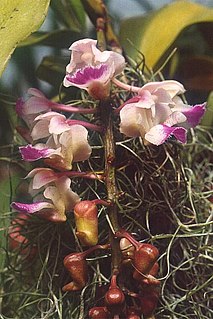
In the botanical classification of plants, Aeridinae is a subtribe of the tribe Vandeae whose representatives all have a monopodial growth habit and do not possess pseudobulbs.
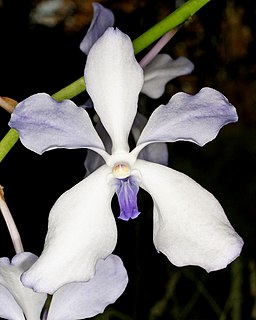
Vanda, abbreviated in the horticultural trade as V., is a genus in the orchid family, Orchidaceae. There are about 87 species, and the genus is commonly cultivated for the marketplace. This genus and its allies are considered to be among the most specifically adapted of all orchids within the Orchidaceae. The genus is highly prized in horticulture for its showy, fragrant, long-lasting, and intensely colorful flowers. Vanda species are widespread across East Asia, Southeast Asia, and New Guinea, with a few species extending into Queensland and some of the islands of the western Pacific.

Aerides, known commonly as cat's-tail orchids and fox brush orchids, is a genus belonging to the orchid family. It is a group of tropical epiphyte orchids that grow mainly in the warm lowlands of tropical Asia from India to southern China to New Guinea. They are valued in horticulture for their racemes of showy, fragrant, colorful flowers.

Ansellia is considered a monotypic genus of orchid, with only one species, Ansellia africana, commonly known as African ansellia or leopard orchid, however, it may in fact be a complex group of species which share common floral structure and growth habit.
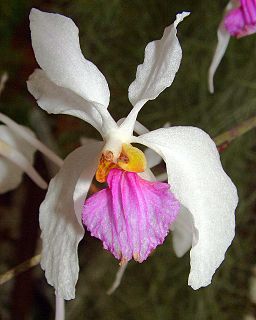
Holcoglossum (Holc.) is a genus of orchids, in the family Orchidaceae. It is native to China and Southeast Asia.
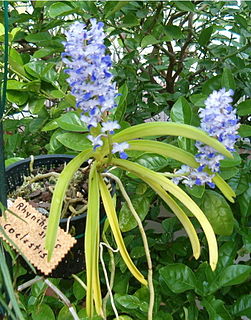
Rhynchostylis is a genus in the orchid family (Orchidaceae), closely allied to the genus Vanda and comprising four currently accepted species native to the Indian Subcontinent, China, Indochina, Malaysia, Indonesia and the Philippines. The name consists of a compound of two Greek elements : rhynchos 'beak' and stylis 'column' – in reference to the very broad, fleshy column of the flower. The flowers are borne in dense racemes and are noted for their intense, spicy fragrance. Although lacking in pseudobulbs, the plants have leathery leaves that are drought-resistant. These orchids grow naturally in warm, moist, shaded tropical areas and will thrive in cultivation if given consistent warmth, uniform moisture and bright, but indirect light. Hobbyists wanting to grow them will need a warm, humid growing environment with gentle air movement. They can be grown in pots, but are better grown in baskets, owing to the extreme fleshiness of their roots. Their unusually fragrant blooms often appear in the slightly cooler winter months.

Sarcochilus, commonly known as butterfly orchids or fairy bells is a genus of about twenty species of flowering plants in the orchid family, Orchidaceae. Most species are epiphytes but a few species only grow on rocks or in leaf litter. Orchids in this genus usually have short stems, leaves arranged in two rows and flowers arranged along unbranched flowering stems. Most species are endemic to Australia but some are found in New Guinea and New Caledonia.

Luisia, commonly known as velvet orchids or 钗子股属 , is a genus of epiphytic or lithophytic orchids in family Orchidaceae. Plants in this genus have flattened roots, long leafy stems, narrow, thick, leathery leaves and short-lived flowers that open sporadically. There are about forty species found from tropical and subtropical Asia to the Western Pacific.
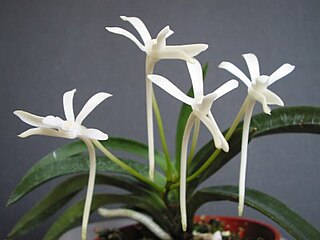
Neofinetia was a genus of flowering plants from the orchid family, Orchidaceae, that is now classified as a Vanda. It contained three species and was distributed in China, Korea, and Japan.
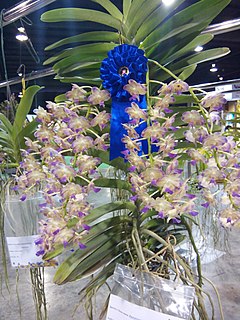
× Perreiraara, abbreviated Prra. in the horticultural trade, is the nothogenus for intergeneric hybrids between the orchid genera Aerides, Rhynchostylis and Vanda.
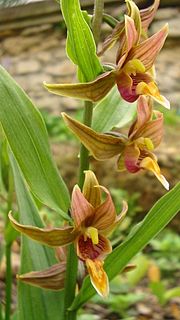
Epipactis gigantea is a species of orchid known as the stream orchid, giant helleborine, and chatterbox. This wildflower is native to western North America from British Columbia to central Mexico. This is one of the most abundant orchids of the Pacific coast of North America.

Rhynchostylis retusa is an orchid, belonging to the Vanda alliance. The inflorescence is a pendant raceme, consisting of more than 100 pink-spotted white flowers. The plant has a short, stout, creeping stem carrying up to 12, curved, fleshy, deeply channeled, keeled, retuse apically leaves and blooms on an axillary pendant to 60 cm (24 in) long, racemose, densely flowered, cylindrical inflorescence that occurs in the winter and early spring. It is famous for its use as a hair-ornament worn by Assamese women during folk dance Bihu on the onset of spring.

Phalaenopsis gigantea is a species of orchid endemic to the island of Borneo and was first described in 1909. The specific epithet gigantea refers to the giant size of its leaves, which can grown over 60 cm in length on a mature plant. It is the largest known Phalaenopsis species.

Rhynchostylis coelestis is a species of orchid native to Cambodia, Thailand and Vietnam. The specific epithet coelestis, derived from the Latin caelum meaning the sky, heavenly, refers to the blue floral colouration.

Vanda coerulescens, also known as sky-blue vanda, is a species of monopodial orchid native to Assam and Arunachal Pradesh, India, eastern Himalayas, southern Yunnan province in China, Myanmar and Thailand.

Vanda sanderiana is a species of orchid. It is commonly called Waling-waling in the Philippines and is also called Sander's Vanda, after Henry Frederick Conrad Sander, a noted orchidologist. The orchid is considered to be the "Queen of Philippine flowers" and is worshiped as a diwata by the indigenous Bagobo people.

Papilionanthe Miss Joaquim, also known as the Singapore orchid, the Princess Aloha orchid and formerly as Vanda Miss Joaquim, is a hybrid orchid that is the national flower of Singapore. For its resilience and year-round blooming quality, it was chosen on 15 April 1981 to represent Singapore's uniqueness and hybrid culture.
"Blue Orchid" is a song by the White Stripes.

Vanda falcata, the wind orchid, is a species of orchid found in China, Korea, and Japan. It was formerly classified in the genus Neofinetia.



















